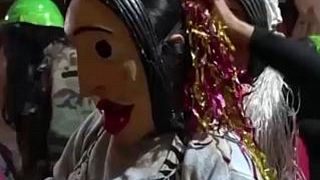Sexual Abuse
The UN has cited indiscipline among troops as a challenge that is frustrating its efforts to fight sexual abuse in the organisation’s peacekeeping missions in the Central African Republic (CAR) and the Democratic Republic of Congo.
The Special Coordinator on Improving the UN Response to Sexual Exploitation and Abuse, Jane Holl Lute, has said that although the missions are showing commitment towards stopping the abuses, there is still resistance and reluctance in identifying the abuses as a problem among the troops.
Security Council adopts resolution on measures to combat sexual abuse & exploitation in
— United Nations (UN) March 11, 2016UNpeacekeepingmissions. pic.twitter.com/PpvHkwSqcn
“People feel as though they were sent to the field to implement mandates, and they are focused on delivering services to the populations that we are sent to serve, and they don’t believe that the issue is one that they need to concern themselves with,” she said.
“We need to specify when we hire people, what are the standards and what is the performance that is expected of you, and how will we know if you are performing or not. And we need ways of accountability. Too often in this organization accountability equals punishment. That is not accountability. Accountability is being answerable for what you have done or what you have failed to do,” Lute added.
UN peacekeeping missions have been dotted with sexual abuse accusations, with the organisation reporting 99 such allegations against its staff members last year. The problem of sexual abuse and exploitation by peacekeepers is not limited to one mission. There have been previous cases of sexual abuse that have taken place in Liberia, Sudan, Lebanon, Kosovo and Bosnia.
The issue has however gained prominence in recent times after reports emerged that female minors were being sexually assaulted and raped by peacekeeping troops in Bangui, the capital of CAR.
#SexualAbuse #Peacekeepers were sent to the Central African Republic to defend the most vulnerable. However,… https://t.co/QVmNrFP8Fw
— YWLI (@ywli_info) May 4, 2016
The CAR case, in addition to that of DR Congo, seems to have given a new dimension of the gravity of the allegations.
In June 2015, a report by the UN’s Office of Internal Oversight Services (OIOS) revealed that peacekeepers frequently paid for sex with cash, jewellery, fancy underwear, dresses, perfume, cellphones and other items. A June 2015 study by professors at New York University, the University of Chicago and Emory also indicated that UN peacekeepers engaged in transactional sex with as many as 58,000 women and girls in Monrovia, Liberia, from 2003 to 2012. Most of the respondents interviewed said they were under age 18 when they began to have sexual relations with the UN personnel, according to Graphic.
There were also reported cases of French soldiers accused of raping young boys in exchange for food and money in CAR. Another report by a US-based advocacy group, AIDS-Free World had also revealed the gruesome storyof three girls in Bangui who were tied up by a French military commander and forced to have sex with a dog in 2014.
Several peacekeepers from the UN Stabilisation Mission in Haiti (MINUSTAH) belonging to the Uruguayan army were in 2013 filmed raping an 18-year-old man.
Peacekeeping missions to Cote d’Ivoire and Burkina Faso were not left out in the unending implications, Graphic further reports.
There were revelations that eight young girls had sex with peacekeeping troops from Benin in exchange for food in 2010 in Cote d’Ivoire, while two French soldiers were suspended last year over allegations of sexually abusing two children while on peacekeeping mission in Burkina Faso.
In Mali, a woman revealed she had been raped by a number of soldiers belonging to the Chadian contingent of the UN Mission in Mali (MINUSMA).
The UN peacekeeping mission in the Democratic Republic of Congo (DRC) identified 10 cases of sexual abuse and rape in 2009. Four Moroccan soldiers, recognised by their victims, were subsequently found guilty and imprisoned.
These cases followed the shocking revelations that peacekeeping soldiers were implicated in 140 cases involving sexual abuse from December 2004 to August 2006 in DRC.
Why is this happening?
According to Graphic, civilians and local populations in places where the peacekeepers are stationed are constantly subjected to all kinds of violence due to their vulnerability. This is because, in war situations, there are problems of breakdown of local governance, security and often food shortages. These challenges are among many others that leave such populations vulnerable to abuse.
When UN peacekeepers commit sexual abuse with impunity it is all-systems failure. My rmks on tackling this scourge: https://t.co/5iopRseQaB
— Samantha Power (@AmbassadorPower) March 10, 2016
And as Sarah Taylor, a women’s rights advocate with Human Rights Watch, observed: “Part of the issue has to do with the way the organisation (UN) is structured. The high demand for UN peacekeepers means that the organisation is constantly scrambling for personnel – so training and oversight take a hit. And if peacekeepers engage in sexual abuse, the UN cannot punish them directly. They are under the legal protection of their home countries.”
What is being done?
The UN has no direct punitive actions against the troops. Troop-contributing countries are left to take actions against their representatives, Graphic notes.
But perhaps the good news is that, in recent times, soldiers from DR Congo and Tanzania who have been mentioned in sex abuse allegations have been put on trial by their respective countries.
A group of 11 Tanzanian peacekeepers accused of sexual exploitation and abuse in DR Congo are also facing paternity claims from their alleged victims.
Three Congolese men from the UN peacekeeping mission in CAR wore blue prison gear as they appeared before a tribunal in Ndolo, a military prison north of the capital Kinshasa, in early April 2016.













02:10
Congo-Rwanda deal: Uncertainty over whether the hostilities will end
00:54
African Human Rights court says it can hear case brought by DRC against Rwanda
01:35
UN and Haitian officials mark one year since Kenyan police arrived to support security efforts
00:43
Central African Republic declares three days of national mourning following stampede
01:42
Gaza residents welcome rare organized aid delivery after months of chaos and hunger
00:32
29 dead and 260 injured in stampede at Bangui high school